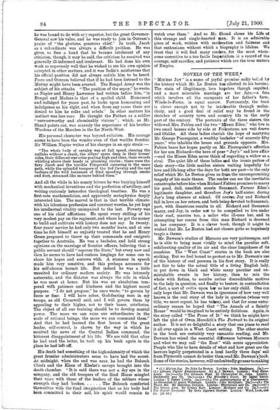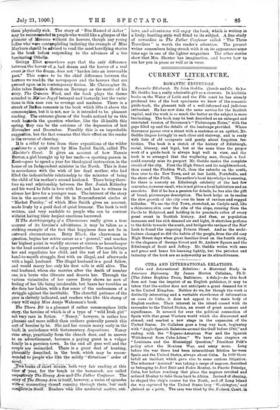NOVELS OF THE WEEK.*
" MIS'ESS Jot" is a name of joyful promise sadly bel:ai by the history which Mr. Le Breton has allotted to his heroine. The stain of illegitimacy, love hopeless though requited, and a most miserable marriage are her late,—a fate which involves all the occupants of her father's farm, Winde-le-Ferne, in equal sorrow. Fortunately, the hook is clever enough not to be intolerable through melan- choly, and a good deal of relief may be found in the sketches of country town and country life in the early part of the century. The portraits of the three sisters, the widowed Mrs. Fabien and the two "Msses Eden," who live in two small houses side by side at Folkestone, are well drawn and lifelike. All these ladies cherish the hope of marrying Mr. George Pierrepoint, a wealthy bachelor "of scarcely fifty years," who inhabits the house and grounds opposite. Mrs. Fabien bases her hopes partly on Mr. Pierrepoint's affection for her son Richard—the hero of poor "Joy's" sad love affair —and the Misses Eden never think of regarding a widow as a rival. The quiet life of these ladies and the ironic pathos of their story—the little maiden sisters waiting hopefully for love and life long after the days for both are past—is the only relief which Mr. Le Breton gives us from the uncompromising tragedy of his main theme. The reader can see the inevitable catastrophe before him when Richard Fabien promises to marry his good, dull, unselfish gousin Susannah, Farmer Eden's legitimate daughter, and therefore Joy's half-sister, during Joy's long absence at school. Of course, Joy and Richard fall in love on her return, and both being devoted to Susannah, part, with disastrous results to all. Richard and Susannah marry, and Joy, in order not to be compelled to live under their roof, marries too, a sailor who ill-uses her, and in attempting her rescue from this man Richard is drowned in her company. It is a clever book, though it might be wished that Mr. Le Breton had not chosen quite so hopelessly tragic a theme.
Dawson's studies of Morocco are very picturesque, and be is able to bring most vividly to mind the peculiar soft, exhilarating quality of its air and the clear limpidness of its sunshine. The "West Coast" stories in the book are also striking. But we feel bound to protest as to Mr. Dawson's use of the history of real persons in his first story. It is really not fair to take the actual title of a living English lady, to put down in black and white many peculiar and un- mistakable events in her history, then to mix the whole with fiction, to ascribe rather discreditable motives to the lady in question, and finally to bestow, in contradiction of fact, a sort of cretin upon her as her only child. One can only hope that Mr. Dawson was in ignorance of how very well known is the real story of the lady in question (whose very title, we must repeat, he has talfen), and that for some extra- ordinary reason he hoped that "The Annals of a Saintly House" would be imagined to be entirely fictitious. Again, in the story called "The Prose of It" we think he might have left the plot of Owen Meredith's The Portrait to its original author. It is not so delightful a story that one pines to read it all over again in a West Coast setting. The other stories in the book are certainly very romantic reading, and Mr. Dawson has seized the essential difference between Morocco and what we may call "the East" with acute appreciation. People who like to have details of what and how great are the horrors legally perpetrated in a land hardly three days' sail from Plymouth cannot do better than read Mr. Dawson's book. Some of the stories, however, will undoubtedly go near to milking • (3.) Mis'ess Joy. By John Le Breton. London 2 Sohn MacQteen. (2.) African Nights' Rntertainment. By A. J. Dawson. London : Wm,. Heine- mann. [6s.]—(3.) The Crimson Treed. By Christopher St. John. r,proon : Duckworth and Co. [es.]—(4.) The Minister's Guest. By Isabel' 8mith. London : T. Fisher Unwin. [es.j—(5.) The Autobiography of a Charwoman- As chronicled by Annie Wakeman. London : John MacQueen. [66.1—(3.) The Thorn Bit. By Dorothea Conyers. London : Mitchinson and Co. [613.3---.(7.) The Strong Arm. By Robert Barr. London : Methuen and Co. [6s.]--(8.) The Father Confessor. By Dora sigerson Shorter. London : Ward, Lock, and Co. ps. 6d.] theni-physically.sick. The story of ." Ben Hanied el Askar " may be reeeminendedte people Who Would like a:glimpse of the glamour Of Morocco without its horrors, though any young ladies Who 'were contsmp14-ing imitating the example of Miss Arayburn should be advised to read the most horrifying stories in the book before reePending . to the advances of a too fascinating Othello.
-0eOrge Eliot aom.ewhere says that the only difference between the horror of...a,had dream and the horror of a real event is that the dream_ does not " hardeninto an irrevocable past!' This seems to he the chief difference between the horrors we read in the newspapers and the horrors that are pressed upon us in contemporary fiction. Mr, Christopher St: John takes Bacon's dietim on Revenge an the motto of his story, The Crilnson Weed, and the book plays the theme sounded in lifie'ess Toy of betrayal' and bastardy, but the varia- tions in this case run to revenge and madness. There is a streak of Italian-romancein the book which lifts it above the commenpliee, but it is not; nor is it intended to be, pleasant reading. • The extreme-gloom of the books noticed by us- this week hazards the question Whether, like the ill-health this spring, 'they can -be the outceme of • the depression of kit November and December. Possibly this' is an 'improbable suggsatiOn, but the fact remains that their effect on the reader is the reverse cheering.: ' • • .
It is a relief to tifin' from these exposition's of the wilder. paisieas td 'a -quiet story by, Miss Isabel Smith, called The Criest.: It gives an account of how Nannie Burton, a girl brought up by her uncle7--a sporting parson in Kent—goes to Spend a Year for theological instruction in the house of an Independent minister in theNorth. This is done in accerdende -With the wish of her dead mother, who had filled the indescribable relationship to the minister of being the child of his mother's second husband. There being there- fore tiO real relationship between the Rev. Josiah Kitterley and his ward he falls in love with her, and- has to witness in silence her love-for a younger man. The interest of the story lies in the account of the life in Nonconformist circles at "Market Pateley," -of which Miss Smith gives an account, made lively by a good deal of quiet humour. The book is well written; and -very readable to People who can be content withat having deefest emotions harrowed.
If T7ze Autabioaraphy.of a -Charkoman really gives a true account' of its 'heroine's adventures, it may be taken as a striking .exareple•otthe faCt that happiness does not lie in outward circumstances. Betty Black, the charwoman in question; :begins her a-ctive career as "general," and reaches hã-highest point in worldly success at sixteen as housekeeper tO the head assistant of a *large pawnbroker: The man betrays her and repudiates her child, and the rest of her life is a hand-to-Mouth struggle, first with an illegal, and afterwards with a legal, husband. The illegal husband is a good fellow, and would Meru her, only his first wife is still alive. The real husband, whom she marries after the death of number one, ifie *brute who illtreats and deserts her. Through the various'vicissitudes of her career Betty shows no sort- of feeling.of her life being intolerable, but bears her troubles as she does her babies, With a fine sense of the uselessness of a struggle egalast the inevitable. The cheerful patience of the pOex' is cleVerly indicated, and readers who like this stamp of story. ivill-enjoy Miss Annie Wakeman's book. "
The Th,orn Bit is.a pleagcnt if rather commonplace little story, the heroine of which is of a type of "wild Irish girl" not very rare inficticei. Nancy," however, is rather less pleasant and More Selfish than authors generally permit this sort of heroine to be She and her cousin marry early in the hear; in ..acCiirde.nce With testainentary..dispositions. Nancy runs away practically from the Church door, and in answer to an advertieement,_beiornes.n. paying guest in a vulgar family in garrhion. town.. In the end all goes well and the couple are' reconciled. . TEere. is a great deal of hunting; in he book, which may be recom- mended to peoplewho like. the mildly" flirtatious " order of • • - • 7rw:cibooks of .short stoxies, both very fair reading at this time- Of -,yrjai, for the-1704 -Or. the hamniock iire called /'e8Pfitive1y The girorig" Father Confessor. The:- story Of.ltke 8trOis4Anni is itself, however, a'aeries of episodes with-al -connecting:. thregd running .thrciugh thein;" but 'each' cOtePeteiniiseli.- Iteadein.;_vibb likelmediztVal .CaStles, out.. . . . . laws, and adventures will enjoy the book, which is written in a lively, bustling style well fitted to its subject. A fine study of cowardice in The Father Confessor caned " the Three Travellers" is worth the reader's attention. The present writer remembers being struck with it on its appearance some time ago in one of the lighter magazines. The other stories show that Mrs. Shorter has imagination, and knows_ how to use her pen in prose as well as in verse.



































 Previous page
Previous page